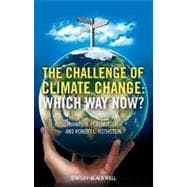
Note: Supplemental materials are not guaranteed with Rental or Used book purchases.
Purchase Benefits
What is included with this book?
| Preface | p. xi |
| Acknowledgments | p. xiv |
| In the Beginning | p. 1 |
| Introduction | p. 1 |
| The Viewpoint Taken | p. 1 |
| What is Your Problem? | p. 6 |
| The Challenges We Face | p. 9 |
| Notes and References | p. 14 |
| A View of Geopolitics | p. 16 |
| Introduction | p. 16 |
| Are There Limits to Growth? | p. 17 |
| Public Goods and Public "Bads" | p. 23 |
| Policymaking and Negotiations | p. 27 |
| Notes and References | p. 31 |
| Surveying the Field | p. 33 |
| Introduction | p. 33 |
| A History of Change | p. 34 |
| Measuring Energy | p. 38 |
| Supply: Where Do We Get It? | p. 39 |
| Demand: How Do We Use It? | p. 42 |
| Will We Run Out of Oil? Or Gas? | p. 43 |
| Forms of Energy | p. 50 |
| Notes and References | p. 53 |
| Global Warming | p. 55 |
| Introduction | p. 55 |
| Temperature of the Planet | p. 57 |
| Greenhouse Gases | p. 58 |
| Is Global Warming Our Fault? | p. 66 |
| The RF Index | p. 67 |
| Air Pollution Revisited | p. 69 |
| Immediate or Short-Term Remedies | p. 71 |
| Limits to Growth and the Commons Revisited | p. 74 |
| Sequestration | p. 76 |
| Notes and References | p. 78 |
| Renewable Energy | p. 81 |
| Introduction | p. 81 |
| Hydroelectric Power | p. 83 |
| Biofuels | p. 85 |
| Wind Power | p. 89 |
| Power from Tides and Waves | p. 91 |
| Direct Use of Solar Energy | p. 93 |
| Nuclear Energy | p. 96 |
| Geothermal Energy | p. 97 |
| Indirect Emissions and Hidden Costs | p. 98 |
| Notes and References | p. 100 |
| Energy Storage | p. 103 |
| Introduction | p. 103 |
| Batteries and Fuel Cells | p. 104 |
| Syngas and Liquid Fuels | p. 107 |
| Hydrogen Gas | p. 109 |
| Pumped Water or Compressed Air | p. 111 |
| Hot Water or Molten Salt | p. 112 |
| Flywheels | p. 114 |
| Notes and References | p. 114 |
| The Negotiating Process | p. 116 |
| Introduction | p. 116 |
| A Period of Transition | p. 117 |
| Our Worst Fears | p. 118 |
| Guidance from a Theory of Bargaining | p. 121 |
| Useful Lessons from the Past | p. 122 |
| What Should a Treaty Accomplish? | p. 125 |
| Where We are Heading | p. 128 |
| Notes and References | p. 129 |
| From Theory to Practice | p. 131 |
| Introduction | p. 131 |
| Different Regimes and Perspectives | p. 132 |
| Improving the Prospects | p. 134 |
| The Debate on Venues | p. 138 |
| Bargaining Strategies: Domestic and International | p. 143 |
| Big Bang or Accelerated Incrementalism? | p. 145 |
| Choices in the Context of Risk | p. 147 |
| Notes and References | p. 148 |
| Where Do We Go from Here? | p. 150 |
| Introduction | p. 150 |
| Is the Feasible Insufficient? | p. 151 |
| Fiscal Measures | p. 155 |
| A Complicated Question | p. 157 |
| An Overall Assessment | p. 160 |
| Choices and Priorities | p. 161 |
| Caveats | p. 166 |
| A To-Do List | p. 167 |
| Notes and References | p. 169 |
| A List of Priorities | p. 171 |
| Introduction | p. 171 |
| Short-Term Gains: Less than 10 Years | p. 172 |
| Medium-Term Improvements: 10-20 Years | p. 176 |
| Long-Term Solutions: More than 20 Years | p. 178 |
| Plan A and Plan B, Simultaneously | p. 182 |
| Notes and References | p. 187 |
| Prospects After Copenhagen | p. 188 |
| Introduction | p. 188 |
| Costly Failure or Small Success? | p. 189 |
| Reframing the Debate | p. 196 |
| The Good News and the Bad News | p. 200 |
| The China Problem | p. 206 |
| Third World Dilemmas | p. 209 |
| Polarized Politics | p. 211 |
| Notes and References | p. 218 |
| Index | p. 223 |
| Table of Contents provided by Ingram. All Rights Reserved. |
The New copy of this book will include any supplemental materials advertised. Please check the title of the book to determine if it should include any access cards, study guides, lab manuals, CDs, etc.
The Used, Rental and eBook copies of this book are not guaranteed to include any supplemental materials. Typically, only the book itself is included. This is true even if the title states it includes any access cards, study guides, lab manuals, CDs, etc.